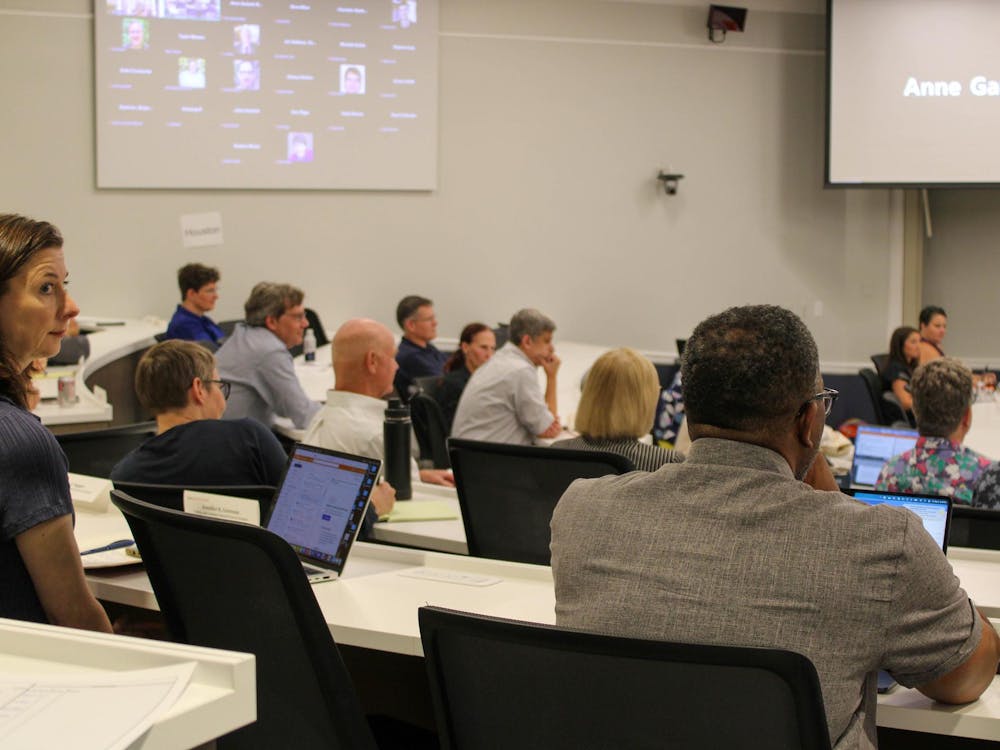The Board of Visitors' Finance Committee met Friday to discuss next year’s fiscal budget, leading to a tense exchange about its contents. The Committee also discussed new housing and dining plans for the College at Wise campus and a new potential corporate partner in student health insurance, among other items on the agenda.
The Finance Committee, chaired by Robert Blue, oversees the University’s financial affairs — including budgeting, tuition and fee approvals, investments, property acquisitions and more. It also monitors research funding, partnerships, commercialization activities and liaises with the University Investment Management Company.
Chief Operating Officer J.J. Davis presented the 2025-26 fiscal year operating budget, which marks a 10.8 percent increase from the previous year — going from roughly $5.8 billion to around $6.5 billion. The increases come in a large part from compensation increases — which increased nearly 3 percent from FY25 — the health settlement, new contracts and the Human Resources budget. Additionally, Davis said that there were over $100 million of budget requests from faculty and University stakeholders this year, but not all were able to be fulfilled.
“We worked tirelessly, even up until the day before we put the budget out to the Board's consideration, to find ways to cut costs, tighten our belts, but also do nothing short term that would have long term implications for the University,” Davis said.
After the rundown of the budget specifics, Board and Committee member Douglas Wetmore said he wanted to see more detail with regards to overhead operating costs and said it was frustrating for him to see the lack of specificity as a Committee member.
“I think the budget presented has a 10.8 percent operating expense increase in it,” Wetmore said. “The Medical Center is a big part of that, but just in terms of the details there, it's been very frustrating for me, from a Finance Committee perspective.”
Wetmore also shared that he was trying to make sure that Diversity, Equity and Inclusion expenses were not present in the upcoming budget, at the discretion of Gov. Glenn Youngkin, in both University administration and the schools.
“I mentioned DEI earlier and I got a letter from the governor asking us to make sure we're especially careful to extract those expenses from the operating budget of the University, both in the administrative overhead level and in the school units,” Wetmore said.
In response to Wetmore’s concerns about the lack of detail in the proposed budget, Davis expressed frustration and disappointment, saying that the people who worked on it ensured that it was responsible with funds. She also said that the administration had been transparent about the budget.
“I guess I'm wildly disappointed,” Davis said. “I think we have gone above and beyond to try to be incredibly transparent, to be incredibly fiscally responsive. And these votes matter in terms of being good stewards of the taxpayer dollars and to maintaining our AAA bond rating.”
The AAA bond rating is assessed by credit rating agencies, based on the ability of the University to pay its bills. According to the presentation at the Board meeting, only four public universities have a AAA bond rating from all three agencies — the University, the University of Texas at Austin, Texas A&M University and the University of North Carolina at Chapel Hill.
Davis went on to say that an open session is not the place to talk about DEI and further added that the budget increases are meaningful because they better the lives of the University community.
“I see you as a valuable member of this Board, and someone I spent considerable amount of time with, trying to educate [and] inform under incredibly intense and dynamic fiscal times,” Davis said. “And I think what we have provided is an exceptionally restrained budget.”
Board and Committee member Paul Harris raised concerns about administrative overhead costs increasing at double the rate of student admission over the past five years and asked Davis if there were good metrics in place to measure budget efficiency.
Davis said there are in fact many comprehensive metrics that are used, such as faculty-to-staff ratios and benchmarks for student services and research, which are developed with an independent consulting firm to assess the University’s national standing.
Additionally, Board and Committee member Daniel Brody said he was concerned that the University’s high out-of-state tuition may be deterring top applicants, as shown by the low yield rate of students who accept an admission offer. He added that the University is not on par with Ivy League institutions in terms of resources and should not charge similar tuition rates.
Rector Robert Hardie challenged that assumption.
“You're right. We're not the Ivy’s. We're better than the Ivy’s” Hardie said. “We have more students now that are turning down Ivys to come to us because of the incredible experience they get here. And so I'm just going to speak up on behalf of my alma mater and say we have a line out the door for out-of-state students.”
Vice Rector Carlos Brown added to the Rector’s comments by saying that the University is very affordable for students both in-state and out-of-state and provides great academic resources for success.
“Objectively, through all the data that has been presented in my four years in this university, we remain one of the most efficient, affordable institutions and the top tier of institutions in this country,” Brown said.
Board and Committee member Paul Manning added that the budget is subject to change and there can be more work done in the future, if needed, to cut costs and be more budget efficient.
“[The budget] is a living document,” Manning said. “Like in all of our companies … these budgets aren't cast in stone. I want to make sure that people should work hard throughout this year in order to take advantage of the efficiencies that we can take.”
After discussion, the fiscal year 2025-26 budget ultimately was approved for implementation starting July 1 with Wetmore and Harris voting against it.
The Committee also approved new housing and dining plans for the Wise campus, in response to a significant increase in occupancy and enrollment, according to Davis. To accommodate this growth, the University will lease approximately 32 additional beds in apartment-style housing from a private developer this fall. Without further opposition, the Board voted unanimously in favor of the new residential program.
The housing, which operates as a self-supporting auxiliary unit, will carry a proposed rate of $8,535 per academic year. Since the apartments also include kitchens, a reduced meal plan will be offered at $4,753 to these students.
Gregory Perryman, student representative and fourth-year College student, shared that students at Wise will be happy with this new housing accommodation after speaking to the students there.
“I talked to some students at Wise including the Student Council president there,” Perryman said. “They're very happy about the value that they're getting for this housing in regards to the housing market cost around the College at Wise”
Other changes made at the meeting included the Board voting unanimously to opt for United Healthcare as the University’s new student insurance vendor, replacing Aetna. Since 1967, the University has required all students — except those enrolled in the School of Continuing and Professional Studies — to maintain health insurance throughout their enrollment as a matter of safety and security. Students who do not have personal or guardian-provided coverage must enroll in the University’s insurance plan. The new contract with United Healthcare is a one-year agreement with renewal options, effective August 1.
In addition to all the action items discussed, the Board approved 12 capital project financial plans and two endowment-related actions in their agenda. Capital projects included the School of Data Science and Entrepreneurship Facility, the Darden faculty office building renovation and a Center for the Arts.
The Committee will reconvene during the Sept. 11 and 12 Board meetings.







